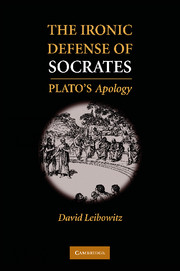Book contents
- Frontmatter
- Contents
- Acknowledgments
- Introduction
- 1 Title and Preliminary Considerations
- 2 Prooemium (17a1–18a6)
- 3 Prothesis (18a7–19a7)
- 4 Defense against the Charges of the First Accusers (19a8–24b2)
- 5 Defense against the Present Accusers (24b3–28b2)
- 6 Second Digression (28b3–34b5)
- 7 Epilogue (34b6–35d8)
- 8 Penalty Section (35e1–38b9)
- 9 Final Speech (38c1–42a5)
- 10 Conclusion
- Short Titles
- Bibliography
- Index
9 - Final Speech (38c1–42a5)
Published online by Cambridge University Press: 05 August 2011
- Frontmatter
- Contents
- Acknowledgments
- Introduction
- 1 Title and Preliminary Considerations
- 2 Prooemium (17a1–18a6)
- 3 Prothesis (18a7–19a7)
- 4 Defense against the Charges of the First Accusers (19a8–24b2)
- 5 Defense against the Present Accusers (24b3–28b2)
- 6 Second Digression (28b3–34b5)
- 7 Epilogue (34b6–35d8)
- 8 Penalty Section (35e1–38b9)
- 9 Final Speech (38c1–42a5)
- 10 Conclusion
- Short Titles
- Bibliography
- Index
Summary
Socrates' final speech (38c1–42a5) has three parts: first he speaks to the condemners; then to the acquitters; and then to, or at least about, the condemners once more.
Speech to the Condemners (38c1–39d9)
To the condemners, Socrates makes three points. First, he says that they are foolish to kill him because he would have died soon anyway. This, of course, may help to explain why he was so willing to provoke the jury (38c1–7; cf. 41d3–5). Second, he says that he was convicted, not because he was at a loss for words – “far from it” – but because he refused to do and say the shameful things that defendants usually do and say. This confirms that he was not being honest when, at the outset of his defense, he implied that he was unfamiliar with courtroom speech and hence incapable of addressing the jury in the customary manner (38d1–39b8, 17c–d). Third, he asserts that by condemning him they have furthered rather than hindered the cause of philosophy or examination in the city – partly because after his death his reputation for wisdom will grow, he will been seen as a martyr, and the city will be put on the defensive (38c1–4; cf. 20d8–e3); but also for another reason:
You have done this deed supposing that you will be released from giving an account of your life, but it will turn out much the opposite for you, as I affirm. There will be more who will refute you, whom I have now been holding back; you did not perceive them.[…]
- Type
- Chapter
- Information
- The Ironic Defense of SocratesPlato's Apology, pp. 166 - 174Publisher: Cambridge University PressPrint publication year: 2010



